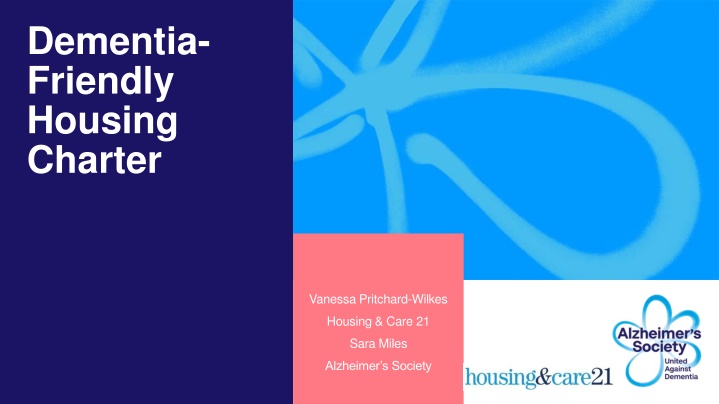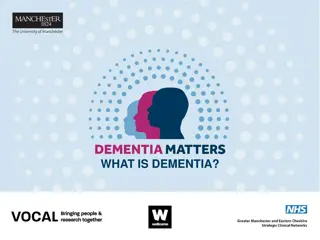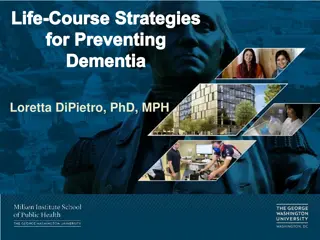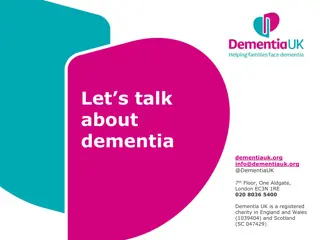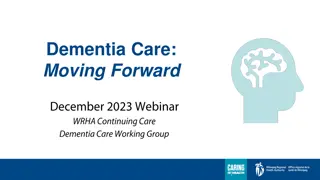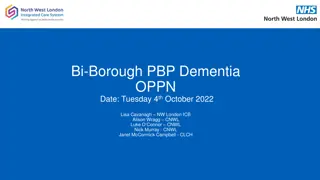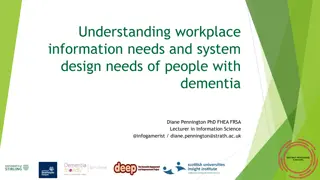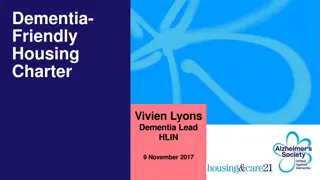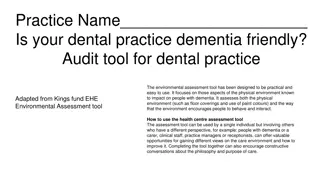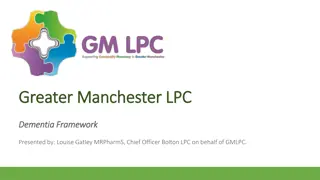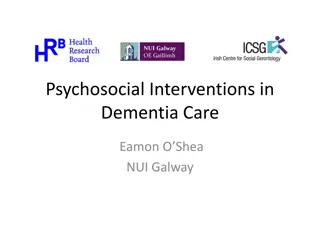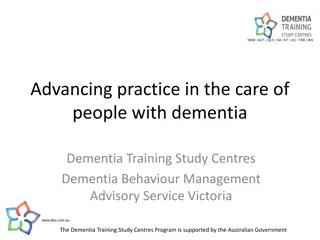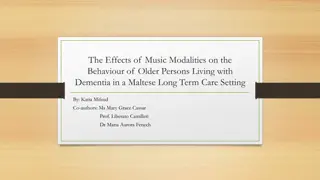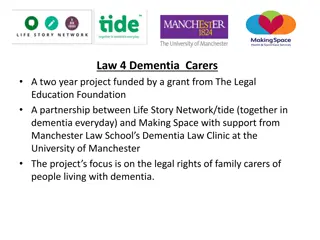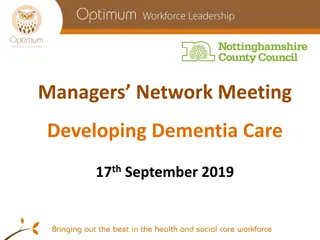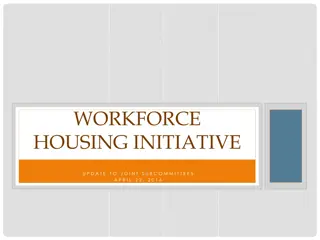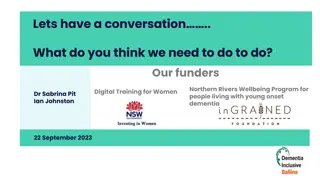Enhancing Dementia-Friendly Housing Initiatives
Exploring the importance of housing for individuals living with dementia, this content discusses the Dementia-Friendly Housing Charter, the Prime Minister's Challenge on Dementia, and current and upcoming projects aimed at creating dementia-friendly environments. Key facts highlight the need for suitable housing and support for people with dementia in the community.
Download Presentation

Please find below an Image/Link to download the presentation.
The content on the website is provided AS IS for your information and personal use only. It may not be sold, licensed, or shared on other websites without obtaining consent from the author.If you encounter any issues during the download, it is possible that the publisher has removed the file from their server.
You are allowed to download the files provided on this website for personal or commercial use, subject to the condition that they are used lawfully. All files are the property of their respective owners.
The content on the website is provided AS IS for your information and personal use only. It may not be sold, licensed, or shared on other websites without obtaining consent from the author.
E N D
Presentation Transcript
Dementia- Friendly Housing Charter Vanessa Pritchard-Wilkes Housing & Care 21 Sara Miles Alzheimer s Society
Prime Ministers Challenge on dementia What we will cover today Why is housing important to people living with dementia Vision and scope Involving people with dementia Charter content Case studies Committing to the Charter 2
2017 2012 Prime Minister s Challenge 20 communities working to become dementia friendly 240 communities working to become dementia friendly How far have we come? 10% of England covered by a Local Dementia Action Alliance 75% of England is covered by a Local Dementia Action Alliance Low awareness and understanding Nearly 2 million Dementia Friends Low Local Authority engagement 55 Local Authorities currently registered under DAA and DFC 3
Current outputs: Dementia-friendly housing charter Previous guides and charters Dementia-friendly Financial Services Charter Dementia-friendly Employers Guide Dementia-friendly Arts Venue Guide Dementia-friendly Technology Charter Accessing and Sharing Information publication Dementia-friendly Retail Guide Dementia-friendly Church Guide Upcoming projects / outputs: Dementia-friendly Heritage Guide Dementia-friendly Cinema Guide Dementia-friendly Air Transport Dementia-friendly Sport Venues Guide 4
Two-thirds of people with dementia live in the community, mostly in mainstream housing People with dementia in the community want support to help them maintain their independence It is widely recognised that much of existing housing is poorly suited to the needs of older people and people with dementia in particular Where people with dementia have moved into specialist housing they identify benefits Housing with care can plays an important role in supporting people with dementia and fill a gap between mainstream homes and care homes Why is housing important to people living with dementia? Home truths: Housing services and support for people with Dementia (2012) 5
Connectedness Actively personalising and creating home Control over decisions about how and where we live Locality - the importance of familiarity; the sense of connection to people and places Cultural expectations and needs What home means to people with dementia Beyond the Front Door (2016) Life Story Network 7
To engage with a wide range of stakeholders within the housing sector to encourage increased awareness of the contribution of housing to the challenges posed by dementia. Vision and scope of the charter To provide the relevant resources and examples of good practice to encourage their integration into all aspects of people (staff), places and processes. Aimed at the full range of professionals working in the housing sector, from planners and architects to landlords and developers, housing managers and handypersons. Designed to help all professionals support people living with dementia in their homes and facilitate consistency and good practice. 8
Attending Service User Review Panels across the UK to understand what was important to people living with dementia when it comes to housing. Involving people with dementia in this charter Key points were: To be enabled to live where you are familiar and are happy living Design wet rooms, few steps, open plan layout, signage, sockets at arms level Technology - Provide sensors/alarms for cooking, sensor lights Staff need to have knowledge and a broad awareness of dementia Accommodation needs to meet people s needs as their dementia progresses and needs to be suitable for adaptations to be made as needed. 9
Evaluation factored in from the beginning Working document Very clear focus Included a broad range of organisations Used existing network for launch and dissemination Involving people with dementia to shape the commitments Successes of this charter 10
Bringing together existing resources and research Heading Aimed at: Supporting people with dementia to live independently Helping housing professionals in their support of people living with dementia in their own homes Provides access to: The knowledge to plan and prepare for future projects, developments and services by influencing initial design and planning of future housing stock Knowledge and resources to make relevant ongoing adaptations and repairs to current housing stock to support people with dementia Showcases: Case studies across the sector 11
A small, locally-based housing association providing predominantly sheltered housing. As many as 14% of their tenants live with dementia. To become more dementia-friendly, they have: Case studies Appointed Dementia Champions All staff on the Board and the main contractors became Dementia Friends Audited properties as part of estate inspections and support planning resulting in an internal action plan Set up Waltham Forest Dementia Action Alliance introduced the Sunshine Club to raise awareness with tenants at fun sessions Developed a dementia-friendly specification for works on empty properties Incorporated dementia design into our cyclical and planned maintenance programmes. Leyton Orient FC, have dedicated a match to raising awareness of dementia for three years. Waltham Forest HA 12
Provides and maintains 32,000 homes - a mix of general needs, specialist housing, and support and care services. Case studies The organisation has taken a holistic approach to being dementia- friendly by: Midland Heart Developing a dementia strategy; Raising awareness among staff, residents and communities through imaginative events; Developing roadshows with its customer panel Employing external trainers for specialist staff It is also now exploring the potential for a partnership approach to training and supporting staff with Worcester University s Association of Dementia Studies. It also makes use of a 1950s dementia pod to stimulate memories and conversation; and is looking to train staff in design and build principles via Stirling University. 13
People Staff who manage properties; Landlords People providing services such as modifications and adaptations Repairs Home maintenance Handyperson services Architects and planners Places The creation and maintenance of suitable housing which incorporates space and design can support people living with dementia. Includes the interior and exterior of buildings Processes Housing systems and infrastructure used in all residential provision, planning, design and development and housing-related services such as repairs, maintenance, adaptations and management. Processes designed to reduce barriers. The three pillars 14
Stakeholders Explanation Designing and building Occupations Planners, architects, building control, facilities or property management, designers, developers. Landlords, developers, housing managers, occupational health, facilities or property management. From inception through design to ready to occupy Stakeholders Managing and supporting The daily running activities of all housing tenures 15
Stakeholders Explanation Modifying and adapting Occupations Occupational therapists, community equipment or telecare providers, handypersons, environmental health officers, home improvement agencies, builders, technical officers and architects Stakeholders (continued) The modification, repair and adaptation of housing and the built environment to meet changing needs 16
People To identifying people affected by dementia who need support To understanding the needs of people To signposting/navigation/advice and information Commitment Statements Place To navigation / setting To raising awareness Processes To applicability To communication To greater information and support for people with dementia to access housing options 17
Commitments to navigation / setting The services required for people to stay in their own homes are not widely known and therefore not accessed or offered There is a lack of appropriate adaptations in properties to provide a more dementia- friendly environment Staff need to know what options are available locally for care and support at home. Commitment Statements Communication of the principles and ways for home adaptations to be more dementia-friendly (for example Alzheimer s Society Making your home dementia- friendly and Stirling University booklet 10 helpful hints for dementia design at home ). Ensure dementia design principles (and other relevant design) are incorporated, including people living in their own homes. Place 18
Demonstrate leadership within the sector by proactively addressing the societal challenges posed by an increasing incidence of dementia Why sign up to the charter? Increase awareness of how dementia and its challenges affect the services and products which an organisation offers Ensure that the needs of customers are met in a consistent and appropriate manner Create an organisation in which customers feel comfortable discussing their needs Be perceived by partners as dementia-friendly which may enhance reputation 19
Sign up to the Housing Charter and commitments Committing to the charter Sign up through the Alzheimer s Society website Publicly announce delivery on the relevant Charter commitment statements Specific actions to be incorporated into the Dementia Action Alliance action plan, if applicable. Deliver the commitments specific to your stakeholder group within a set, individually determined and planned time-frame Select a senior member of staff to champion the initiative and ensure that the appropriate delivery plan is established and progressed Evidence and report back on progress and outcomes of the identified commitment statements. 20
Sign up to the charter via Alzheimers Society website alzheimers.org.uk/housingcharter What can you do now? Make a plan for your colleagues to become Dementia Friends register your organisation at dementiafriends.org.uk/register-partner-admin Sign up to Dementia Words Matter and find out more through the Dementia Voices website. If you can help us to engage with relevant housing sector organisations and to disseminate the Dementia Friendly Housing Charter, please email sara-jane.little@alzheimers.org.uk 21
Members of the Prime Ministers Champion Group for housing Alzheimer s Society Housing & Care 21 Anchor ARCO Care & Repair England Guinness Partnership Pozzoni Housing LIN Keepmoat McCarthy & Stone Members of the Dementia & Housing Working Group National Housing Federation Royal Town Planning Institute Tunstall Your Life Causeway Service User Review Panel Chichester Positive thinkers League of Minds North Somerset Living With Dementia Group South Eastern/Belfast SURP group Acknowledgements 22
Questions? Vanessa.pritchard-wilkes@housingandcare21.co.uk Sara.miles@alzheimers.org.uk 23
